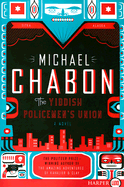The Yiddish Policemen's Union

I not only really wanted to like The Yiddish Policemen’s Union by Michael Chabon, I expected to love it. Chabon is one of my favorite authors, and Kavalier and Clay is a true masterpiece. However, his latest novel is a far cry from, really, any of his previous works.
An alternate-history book that will draw inevitable comparisons to Philip Roth’s The Plot Against America, Chabon envisions a world where, as FDR actually suggested (which I didn’t know) that a Jewish settlement be located in Alaska. Derisively called the “frozen Chosen” by Americans (referred to as “our neighbors in the South” by the locals), the area is due to be returned to America, and the Jews are due to go…somewhere.
“It’s a strange time to be a Jew,” almost every character states at one point or another, and indeed it’s true. This is the backdrop to the novel, which in most respects is – or attempts to be – a hardboiled detective story.
My full review is below.
Our Mickey Spillane is a policeman named Meyer Landsman, a beaten-down shell of his former self, who spends his nights drunk and contemplating suicide. One morning, he’s called to investigate the murder of someone also living in his fleabag hotel.
I’d get into the story, which involves several different sects of Jews, chess and the Holy Land…but it’s really hard for me to do that. The book feels far too clever for its own good, and at several times Chabon refers back to characters who I barely remembered – who turn out to be incredibly important and relevant. In the zeal to keep this alternative history “real,” Chabon can’t draw out a historical review, so characters casually refer to things, in Yiddish slang no less, that take several repetitions to make sense. Many characters have similar, unfamiliar Eastern European names, and the way their roles intertwine gets more confusing as the book progresses, until perhaps the last third of the book.
Perhaps most disappointingly, the book seems to explain itself towards the end in two somewhat cheap ways – through a flashback, and then by Landsman suddenly figuring a key component out in the last few pages. It feels beneath an author as brilliantly talented as Chabon, and while there’s no denying it’s a good book, it’s far from a great one. I didn’t much care for most of the characters, but I perservered because it was Chabon, and also because I did want to see the story play out…which it only sort of does.
All in all, a disappointment, and a book I couldn’t honestly recommend.
Rating: 5.5/10.


